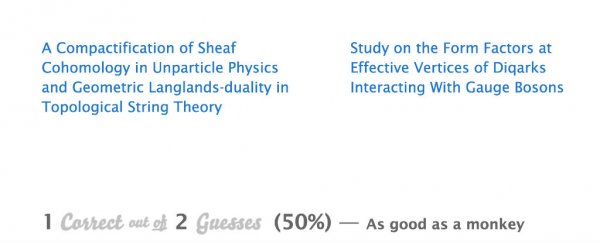If you sometimes struggle to make sense of the latest developments in physics - time crystals, anyone? - don't worry, you're not alone.
Over the past few decades, the field has become awash with made-up words and phrases to describe the mind-numbingly complex and narrow niches that arise from increased specialisation, and now all we can do is look at "Pentaquark Theta^+ production via gamma N ->K^*bar Theta^+(3/2^(+-))," and weep.
And while you might think it's just us laypeople who struggle with Polyakov loops, fuzzy spheres, and iQuarkonium, even physicists themselves are kind of at a loss.
As David Kaiser, an MIT professor of physics and the history of science, told Ephrat Livni at Quartz, the recent trend of 'micro-specialisation' has led to a bunch of physicists who have carved out such specific niches for themselves, even their peers struggle to understand them.
He says his colleagues often joke about how such laser focus has led to a handful of specialists who are the only ones in the world who can speak on something like "super D-branes" with any kind of authority.
"[M]ore and more, we need to know more and more about less and less, ultimately knowing nothing about anything," he quips.
As this PhD Comics graph so deftly illustrates:

Livni explains that the field becoming incomprehensible and obscure - even to its practitioners - has been going on since around 1948, when the end of World War II saw a proliferation of graduate students who needed something to specialise in.
This led to the incredibly complex language that's used in many physics specialisations today - something that some researchers suspect is a deliberate attempt to obscure what they do not know.
"It is the common subconscious fear of exposing oneself to scrutiny," Samuel Goudsmit, editor of the journal Physics Review Letters, wrote in 1964. "If a paper is too clear, it might be too easy for readers to see through it and discover its weakness."
But that's the cynical view of things - the non-cynical view is that we've got a bunch of incredible experts who don't have time for the rest of us plebs to get on their level.
And now all we can do is laugh - which is where the amazing website, ArXiv vs SnarXiv, comes in.
Pitting actual paper titles posted to the pre-print physics site, ArXiv.org, against fake ones posted to SnarXiv.org, the site serves up quite a challenge.
If you do well, you'll be praised as being "as good as a monkey" or an "undergraduate", but if you struggle, it will tell you to "guess harder", or "try using ADS/CFT", which is just cruel.
Here are our favourite fake papers so far:
- Large Mass Effects
- Some Little-known Illustrations
- Deriving Formulating Chiral Matrix Models Surrounded by a Hypersurface Defect
- Perturbation Theory on Ext^5(\R,\Q) Bundles Over P^m
- Squarks
And our favourite real ones:
- The Vector Coupling in IR Region From Splittings in Bottomonium
- Highlights of the Theory
- Spacelike Branes
- On Tunnelling in Two-Throat Warped Reheating
- Phenomenology of iQuarkonium
- Mind the Gap
Try your luck here, but be warned - if you do it for long enough, suddenly squarks don't sound so bad.
